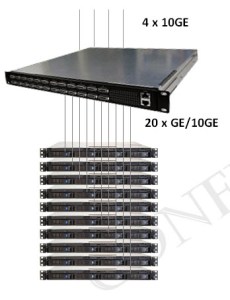
The Santa Clara, Calif.-based company makes 10-gigabit Ethernet switches that compete with the likes of Cisco, Foundry Networks and Force10 Networks. These products solve a fundamental problem: as the number of servers in a data center skyrockets, so do the bandwidth needs. Today’s servers are also more dense: they can fit multiple quad-core processors in a single machine. And each one of those processors needs bandwidth. These trends are changing the networking infrastucture that is needed inside the data center.
[aditude-amp id="flyingcarpet" targeting='{"env":"staging","page_type":"article","post_id":98967,"post_type":"story","post_chan":"none","tags":null,"ai":false,"category":"none","all_categories":"business,","session":"C"}']The company is interesting because you don’t expect to see someone take on these big companies inside the core of the data center, which should be the domain of billion-dollar companies, not start-ups. It’s been a long time since anyone had a chance to challenge Cisco in this space. But Woven’s first round of products got traction and this one should be interesting to watch.
Woven is addressing the problem with the new TRX 200 family of 10-gigabit Ethernet switches with 24 ports. It fits in the same networking infrsatructure as Woven’s existing product, the EFX 1000. The company has been working on this new product line for some time since it had to design its own custom chips.
AI Weekly
The must-read newsletter for AI and Big Data industry written by Khari Johnson, Kyle Wiggers, and Seth Colaner.
Included with VentureBeat Insider and VentureBeat VIP memberships.
Startups in this area aren’t all that plentiful. But this one is interesting because it’s headed by Jeff Thermond, who has had a Midas touch in the field of networking. He founded Epigram, a maker of phoneline networking chips for homes, and, during its pre-revenue stage, sold it for $316 million to Broadcom in 1999 during the height of the Internet bubble. He then ran Broadcom’s Wi-Fi networking chip division for five years and helped it take the leadership in a market full of dozens of rivals.
VentureBeat's mission is to be a digital town square for technical decision-makers to gain knowledge about transformative enterprise technology and transact. Learn More
